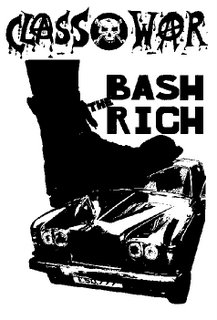



Here’s a thought that occurred to me after Sunday’s meeting (Keir will be posting notes from that later). It’s not very well articulated but it might prompt something more coherent...
At the meeting a few people talked about ‘an extended we’ as one of the signs that we’re winning. What does that mean? I think it’s to do with feeling connected – not emotionally, figuratively or psychologically, but really connected – to other people, so that when things were kicking off in Seattle, say, we felt as one with those who were there. Or rather we were as one with them – this isn’t a subjective thing.
All this seems airy-fairy (or just plain bollocks) because it’s hard to avoid talking about it in subjective, individualist or idealist terms, even though we’re trying to get away from all those dualisms. Maybe another way into this is to think again about social movements as processes not things. It’s counter-intuitive because it means thinking about ourselves not as ourselves (individuals bound up in revolutionary politics) but as a collection of processes. The moments when we’re winning are those when we can see social relations moving. At those times our movement isn’t a movement of us (activists vs others) but a moving of social relations, an unfreezing of all that is fixed.
Maybe there’s a link here to Marx’s idea of the proletariat being the class that abolishes itself as a class (as opposed to those who worship & defend the most fixed and static notions of what class is, as a thing). We felt we were winning because we weren’t ‘we’ any more (sorry, this makes a bit more sense if you read it out loud); maybe we’d even abolished any idea of a ‘we’, because there was no outside, no ‘they’ (this relates to a comment made the other night which questioned the whole idea of winning because the way we’d framed it suggested someone else would be losing). This moving of social relations is like the breaking of an ice-floe: it has no edges or boundaries (“this group are in our movement, this group aren’t” etc), or else the boundaries are always in motion; the moving ripples through everywhere – absolutely everywhere.
Of course when this happens, the ‘equilibrium’ of everyday life is shattered. Capital likes to present itself as fixed, immutable or natural (it depends on an endless production of novelty, but it is the same old same old). So maybe that’s one of the things about winning: it’s when we (an extended ‘we’) reveal the social relations of capital as partial, temporary.
